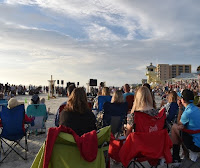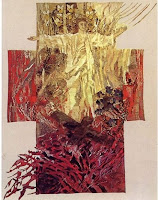Recently a variation has become popular: “Guns aren’t the
problem. Mental illness is the problem.” Even if the Uvalde shooter was
mentally ill, how many children would he have killed if he did not have an
assault rifle? Without a gun all you have is a disturbed young man. Furthermore,
blaming the mentally ill for gun violence just adds another layer of stigma to
mental illness. It makes it even less likely that those with mental illness
will seek the help they need.
These slogans come straight from the gun lobby’s playbook. Those
who repeat such things are being led to the slaughter by those whose only
motive is to sell more guns. To identify the problem of gun violence all you
have to do is follow the money. Who makes money off the corpses of school children?
Gun manufacturers, of course!
They turn every act of gun violence into a reason to buy more
guns. They tell people they need more guns to protect themselves from bad guys
with guns and from a government that wants to restrict guns. “Buy them while
you still can!” The gun lobby uses fear to manipulate people. They turn
patriotism into a gimmick to sell guns. No one notices the irony of using the
second amendment, which speaks of the necessity of a “well regulated militia,” for
a crusade to oppose regulation.
But as much as I can see through the duplicity of the slogans,
I have to admit that ultimately it is true that people are responsible. With or
without sophisticated weaponry people will kill people. Not as efficiently
perhaps, but they will still kill. The source of violence is humans.
Presently I am researching an upcoming podcast episode on
the biblical tale of Cain and Abel. The Book of Genesis tells the story of the
first murder. No firearms in sight, but Cain managed to use a primitive weapon –
likely a farming tool - to spill his brother’s blood. People kill people. They
always have.
The only permanent solution to violence is if people choose nonviolence.
Government restrictions on weapons may decrease the death toll, but the problem
of violence is deeper than anything that can be solved by legislation alone.
Violence is ultimately a spiritual problem.
That is what Jesus taught. He said that the cause of murder
is anger in the human heart. Jesus’ brother James said that external violence
come from inner violence and greed. For that reason Jesus advocated a spiritual
discipline of nonviolence, telling his followers to turn the other cheek and refuse
to return evil for evil.
Jesus’ teaching on nonviolence and nonresistance is for
individuals. It cannot be translated into national or international policy. Any
nation that follows the Way of Jesus will undoubtedly be crucified, just as
Jesus was crucified. There is no such thing as a “Christian nation.” The term
is an oxymoron. At his trial for treason Jesus made it clear that he had no
interest in earthly government. He said, “If my kingdom were of this world my
disciples would fight…. But my kingdom is not of this world.”
The earliest Christian movement was an intentional community
that practiced unconditional love for all, even enemies. Jesus understood the
Kingdom of God as an alternative to political and military kingdoms. Jesus did
not come to establish an earthly kingdom. The Church is to be a light to the
nations, not a nation among nations.
Jesus’ solution to human sin – including gun violence – was a
radical one. Jesus told his followers to put away their weapons, “For all who
take the sword will perish by the sword.” He instructed his followers NOT to
defend themselves … or him. Once again it is ironic that so many Christians find
a reason to ignore Christ’s clear teachings on this subject.
Jesus was not a conservative. He was not a liberal. He was
not a zealot, who were the patriots of his day. Jesus was a radical spiritual
reformer. He was more like Buddha than Muhammad. Jesus’ vision for the Church
is more like the Sangha than the Caliphate. It was a spiritual movement, not a
political party. Jesus set up an alternative community that lived by a
different standard than the state or political ideologies.
Jesus knew that the only real solution to the problems of
suffering, evil, and violence in society was to live by the standards of the
Kingdom of God now. That is what his Sermon on the Mount was all about. It is a
Declaration of Independence from the cycle of human violence. It is the
Constitution of the Kingdom of God.
The way to stop gun violence is to address the root of violence in the human heart, the anger and hate that is so clearly displayed in
the nastiness of political rhetoric today. Peace begins by addressing the
violence in our own hearts – not others’ hearts. Our heart is the only one we
can change, and even that changes only by the grace of God.
As Jesus said, some evil cannot be driven out by anything but prayer. Gun violence is a spiritual issue more than a political one. When our words and actions begin to flow from a reservoir of inner peace rather than political strife, only then will there be peace on earth. Only then will people not kill people. “Thy kingdom come. Thy will be done on earth as it is in heaven.”






.jpg)









